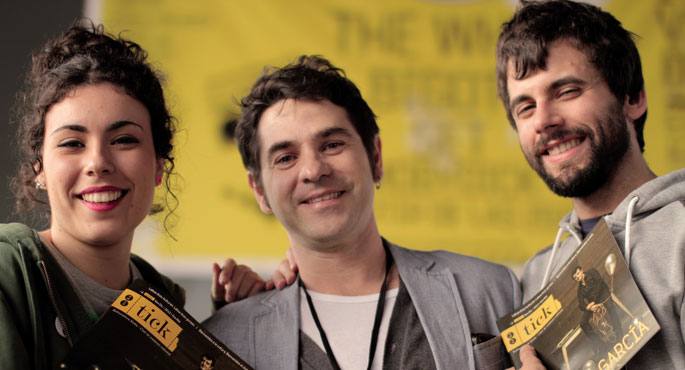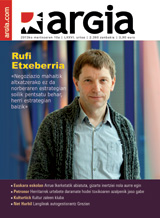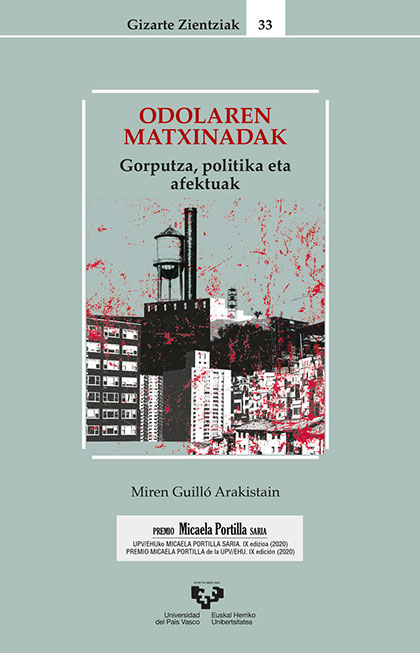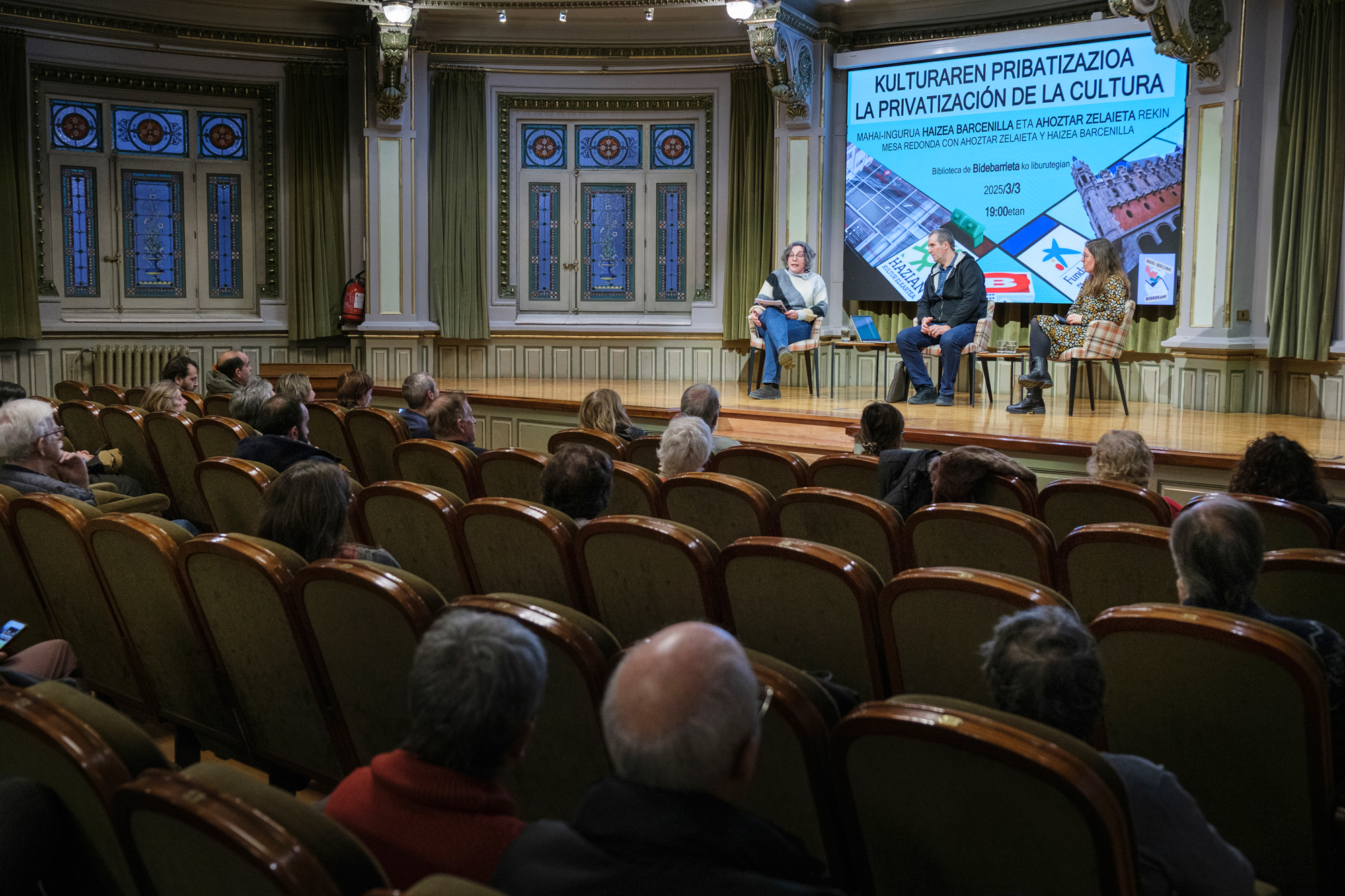Commitment to culture is rewarded
- The crisis, rising taxes or cutting budgets have put the cultural industry at risk. However, according to Pío Ortiz de Pinedo, the sector of cultural creation is hard, it has already faced another type of crisis. For many years, Ortiz de Pinedo has been the manager of the Hortzmuga theatre group and later director of the Association of Theatrical Production Companies of the Basque Country. He is currently responsible for Kulturtick or the culture club.

“Basque creators, producers and collectives must be encouraged to move cultural proposals forward. Because agents put money and risk. But as important as that is to reach the last link in the cultural process, that is, to show, distribute and communicate these proposals. Nobody creates for a closed box, so the public doesn't see it. Every cultural proposal aims to share with the public, generate criticism, be participative, transmit a message and create something to say. That is why it is essential to promote cultural consumption, to seek and dynamize a new public and to reward the fidelity that all this can generate”. This is summarized by the director of Kulturtick, Pío Ortiz de Pinedo, the objective of this new club of fans of culture.
Born in the Basque Autonomous Community, its objective is to extend to the whole of the Basque Country, “because culture does not understand administrative boundaries and, in most cases, overcomes them. The Basque culture is the identity of all, which unites us”, argues Ortiz de Pinedo. “Our club is a cultural consumer club, we want to create a large number of partners and partners that show interest and commitment to culture.”
This club offers advantages when it comes to consuming culture, mainly cheaper prices and unique proposals. “It is not, however, a question of lowering the price of entry, but of encouraging the public and rewarding their loyalty to culture. We want to give a permanent advantage to our partners, offering a varied and comprehensive year-round offer, covering all cultural areas.” The performing arts, music, cinema, audiovisual media, museums and book presentations are the central themes. In addition, a dissemination and communication service is offered to spaces, halls or promoters that promote these cultural proposals.
Varied and quality cultural menu
Behind Kulturtick are Eskena (association that brings together performing arts companies), Kultura Live (association of live music venues in Euskal Herria), Last Tour International (organizers of the BBK Live Festival, among others), Zineuskadi (association of film companies), Metaposta and the Association of Book Sellers. There are two other strategic partners. Firstly, EITB. Thanks to a convention, cultural proposals are published weekly. And on the other hand, TR3SC, Barcelona’s cultural consumption club, founded six years ago. “Your experience is very useful to us,” says Ortiz de Pinedo.
Kulturtick works with proposals from both the public and private spheres, with cultural promoters and aretos. They look after territoriality and they want to attract as diverse an audience as possible, not forgetting to push their creators. “We want Kulturtick to be a useful tool for Basque creators. In this sense, although the proposals in Euskera are scarcer, we try to make all or most of those that exist spectacular, making positive discrimination.”
The Kulturtick club currently has about 600 members, but because of the special promotions that have been launched, they want to reach 1,000 members. These special promotions offer advantages for great shows. For example, discounts on tickets for Circ du Soleil or the BBK Live Festival. The club gives an entry to see the latest work by Circ du Soleil, Kooza. Partners of the Association of Old Partners also have a 20% discount on these activities.
There are two modalities to be a member of the club and two prices. One of EUR 32 per year and another of EUR 52 per year. This second option allows you to receive the Tick Gift, i.e. two free tickets between specific events.
In addition, the Club’s membership card discounts are for two people. “The goal is to attract more people to the show, that the partner bring a friend and that cultural consumption is double.”
Supply demand meter
The club is also a thermometer that measures the cultural offer in Euskal Herria, “it allows us to know what our partners prefer, what interests them. The journey so far is short, but for the future we will also have the demand of the public, in addition to the supply, and that information is very valuable”, in the words of Ruiz de Pinedo.
In addition to professional associations in the sector, the founders are also behind Kulturtick. After all, the creator is also obliged to be a cultural manager. “In fact, it shouldn’t be that way, as most creators don’t have a large infrastructure, but they become the main transmitters of the work created. It's not a nice job for many creators. It is true, on the other hand, that since professional associations have been established covering different cultural sectors, this work has been quite facilitated and improved. Infrastructures such as Eskena or Kultura Live can be used for this management work. Culture itself has also been professionalized and several companies have been set up. In addition to these professional infrastructures, the public space has been the one that has most managed and structured the culture itself. The first cultural managers have been the municipalities and public institutions that have turned access to culture into a citizen’s right.”
One of Kulturtick’s objectives is to promote cultural consumption, but is it good that consumption and culture are united? According to Pío Ortiz de Pinedo, “in culture, the economy has always been dissipated in some way. They often don't like to talk about selling, distributing and these things. But, of course, it's natural. Consumption is not bad, we all consume: food, clothing… Why not culture? There are also initiatives that require artisanal work and are more difficult to market, but from the moment we talk about the cultural industry, consumption is necessary for the project to move forward. Today, production and creativity are totally linked to consumption.”
These times of crisis have not favored the sector. “There’s production and it’s good,” says Kulturtick’s director. “The culture sector is in itself very resilient, it has been in provisional conditions for a long time. There is a great capacity for suffering and self-management, for the good and for the bad. This situation cannot, of course, last long. For the work to be good, it needs the right means. Some believe that culture can revive in times of crisis. I do not agree. In culture, as in other sectors, decent working conditions, physically and mentally, are necessary for creativity to be adequate”.
I'm talking about Interview. With water and sand
Authors: Telmo Irureta and Mireia Gabilondo.
The actors: Telmo Irureta and Dorleta Urretabizkaia.
Directed by: Assisted by Mireia Gabilondo.
The company is: The temptation.
When: April 2nd.
In which: At the Victoria Eugenia... [+]
On March 7, the 150th anniversary of the birth of Maurice Ravel, the best Basque composer of all time. And in LA LUZ a tribute was paid to this composer, recalling the influence of the famous Bolero on the collective imagination.
By chance, Deutsche Grammophon has just released... [+]
Odolaren matxinadak. Gorputza, politika eta afektuak
Miren Guilló
EHU, 2024
Miren Guilló antropologoaren saiakera berria argitaratu du EHUk. Odolaren matxinada da izenburu... [+]
Haurtzaroaren amaiera eleberri distopikoa idatzi zuen Arthur Clarkek, 1953. urtean: jolasteari utzi dion gizarte baten deskribapena. Eta ez al da bereziki haurtzaroa jolasteko garaia? Jolasteko, harritzeko, ikusmiratzeko eta galdera biziak egiteko unea. Ulertzeko tartea zabalik... [+]
Lantegia espazioa, Esperantza liburutegia, Arte Ederren Museoko eta Euskal Museoko lanak, Urdaibaiko Guggenheim proiektua... Ugari dira Bilbon eta Bizkaian kulturaren ikuspegi utilitarista eta pribatizazioa agerian uzten dituzten adibideak. Alde Zaharreko haur eta gazteentzako... [+]
The lights of the theater are on. Discreetly, I’m walking on the steps: the school performance is about to begin. The young men run to their seats, full of life and joy. The retreat has the taste of liberation, but this feeling of freedom speaks Spanish or French. This... [+]























